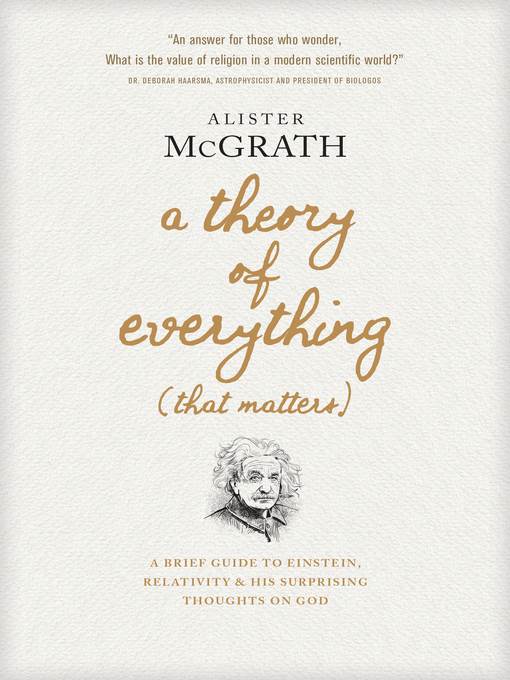
A Theory of Everything (That Matters)
A Brief Guide to Einstein, Relativity, and His Surprising Thoughts on God
کتاب های مرتبط
- اطلاعات
- نقد و بررسی
- دیدگاه کاربران
نقد و بررسی

Starred review from July 29, 2019
McGrath (Theology), professor of science and religion at Oxford University, provides an excellent study of Einstein’s theories in relation to his beliefs about God. McGrath explains the scientific achievements of Isaac Newton that dominated the world of physics while Einstein was working as an assistant in a Swiss patent shop in 1905. That year, Einstein published an article that would “overthrow” Newtonian ideas, in which he proposed that light was composed of particles and that each particle’s energy could be measured by the frequency of its electromagnetic radiation. McGrath then lays out Einstein’s subsequent work, article-by-article, establishing his theory of special relativity. Though Einstein revolutionized physics, he failed in his quest to discover a “grand theory of everything,” a problem he wrestled with until his death. While Einstein did not believe in a personal God, McGrath writes, he was driven by a “cosmic religious feeling” that became his “strongest and noblest motive for scientific research.” McGrath, a Christian, encourages other Christians to consider Einstein’s teachings as a mechanism for thinking about their own ideas regarding the relationship between science, religion, and the “meaning of everything.” This analysis of Einstein’s ideas will appeal to any Christian reader looking to contemplate connections between God and the unresolved mysteries of scientific discovery.

September 27, 2019
Humans are born with deep longings and questions about meaning and purpose. We often look to the brightest among us to bring clarity to our toughest queries. Albert Einstein (1879-1955), while an authority on science, was also frequently approached for insight into life's ultimate significance and value. McGrath (science, religion, Oxford Univ.) looks seriously at Einstein's views, providing an overview of his achievements followed by a critique of his beliefs on God and the nature of reality. McGrath does not offer much in the way of revelatory findings; there are no major surprises here. As many likely know, Einstein did not believe in a personal God, as is witnessed in the Judeo-Christian religions. He did, however, conceive of the universe as profoundly rational and maintained always that there lay something deep and mysterious behind that rationality. VERDICT The broad range of topics that interested Einstein, combined with his sharp knowledge, continue to capture the public's fascination. This latest study of this world figure is recommended for readers seeking more narrative than equations in discovering the life of one of the greatest scientists to ever live.--Denis Frias, Mississauga Lib. Syst., Ont.
Copyright 2019 Library Journal, LLC Used with permission.

























دیدگاه کاربران